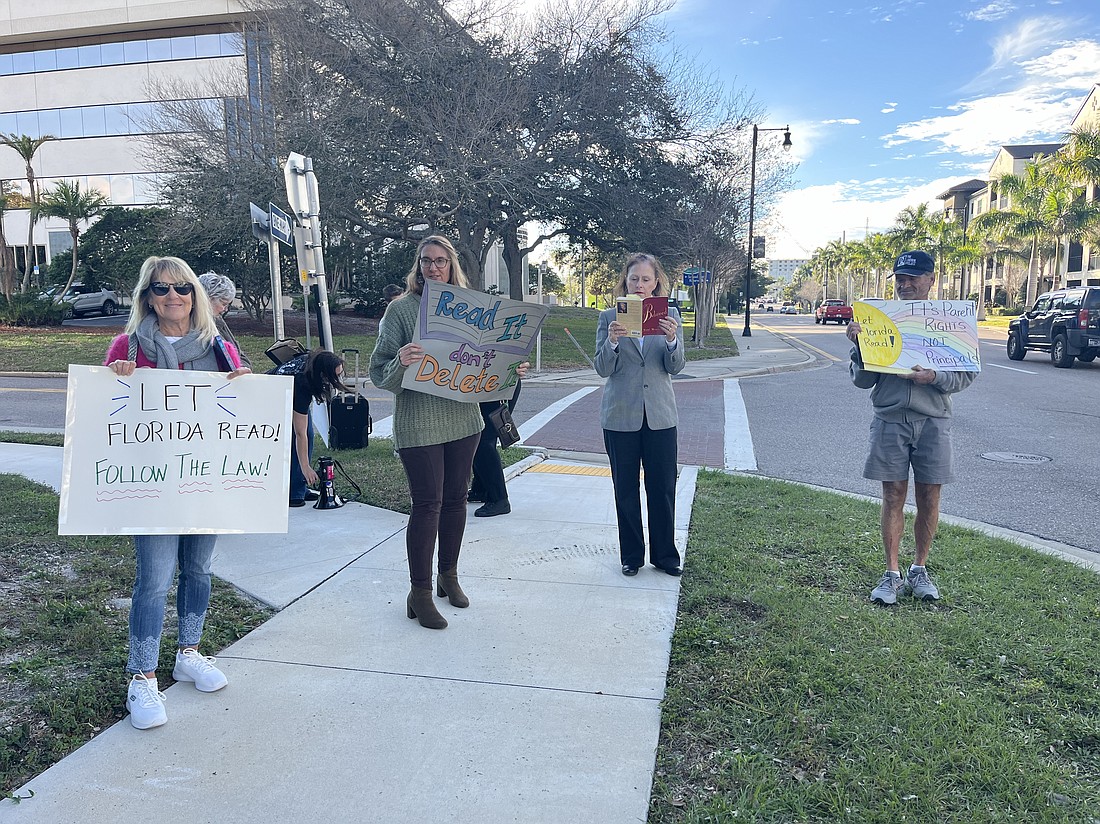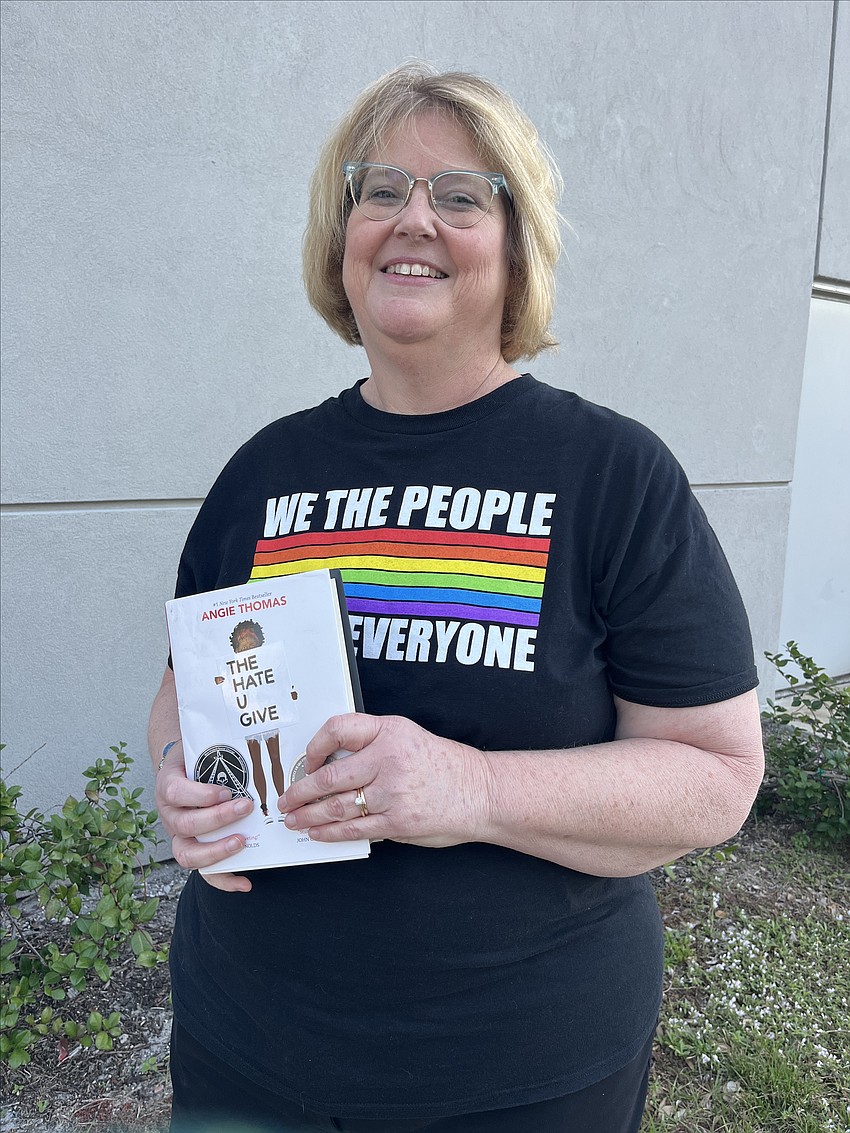- November 19, 2025
-
-
Loading

Loading

Bradenton’s Marie Masferrer stood on Manatee Avenue West outside the School District of Manatee County’s School Support Center with a copy of “The Hate U Give” in her hands.
She was joined by five other Manatee County residents to bring attention to the school district’s new policy on reviewing and potentially removing books from school and classroom libraries that was approved at a School Board of Manatee County meeting Jan. 16.
The policy was approved 4-1 with board member Mary Foreman dissenting.
Masferrer, the founder of Read on Manatee!, went before the school board Jan. 30 to speak out against the district’s policy and to encourage board members to approve a policy that requires the book review process to be public. She also wanted a policy that would include parents in the process.
Read on Manatee! is a grassroots organization formed to oppose book bans in Manatee County public schools.
“Our goal is to show the librarians and teachers in Manatee County that there are people who are supporting our libraries and believe in our libraries and classrooms,” Masferrer said. “This is, for me, the civil rights fight of my life. We are in the middle of a renaissance of books that represent our society in all shapes and forms and books that represent children in every capacity, in every shape and every family form.”

The school district’s book review policy allows a Manatee County parent and resident to make an objection to a book using a form provided on the district’s website.
Once a book is challenged, Derek Jensen, the deputy superintendent of instructional services, will appoint one or more principals to conduct a school-level review of the material.
The designated principal will inform the school’s School Advisory Committee of the objection, then read and review the challenged book or materials. The principal will review the objection form, will consult professional review and academic resources to weigh the merits against the reasons the book was challenged. The principal will make a decision on whether to keep the book, add parental restrictions, or remove the book.
The decision will be communicated to the curriculum department. If the decided is to discontinue the book at the identified school level, the principal must submit a written report to Jensen explaining the decision and the reasons for discontinuation.
Bradenton’s Shannon Keever, with Women’s Voices of Southwest Florida, said the school board should reconsider its policy.
“We don’t have libraries to be echo chambers to our personal thoughts and beliefs,” she said. “We have libraries so we can explore outside of our own experiences and thoughts and beliefs. That is a vital part of education.”
Trevor Almy, an English teacher at Rowlett Middle Academy, said he feels the “anxiety and the pressure” of ensuring his class library “conforms to a pluralistic society where the values today are becoming increasingly divided.”
“Ironically, I can’t think of anything better to make us less polarized, to make us more empathetic toward one another than reading as it cultivates the empathy necessary for that,” he said. “Censorship never works.”
Foreman shared several concerns regarding the policy with board members, including the lack of opportunities for parents to provide input in the review process and the lack of school board involvement in the process.
“I’m not proposing we vote as a board on every objection,” she said. “If it’s decided the book will stay, principals have had control of their libraries for years so I don’t think we need to affirm that. However, if it’s being banned I would really like it to come to us and have the curriculum department come and do a presentation, telling us why it should be removed.”
Foreman said the board should receive copies of the objects and principals’ reports. If the board votes on the objections, then parents can attend meetings to provide input and write to the board.
“I don’t feel we should be putting that burden on principals,” Foreman said. “We are responsible, and we should take the heat.”
Foreman also expressed concerns over adding more to principals’ responsibilities as reviewing the books could take a long time.
Jason Wysong, the superintendent of the school district, said the purpose of selecting one principal to determine whether a book should be discontinued is to ensure multiple principals aren’t potentially making different decisions about the same book. He said having one principal review a book means the district can support the principal by providing any resources the principal might need to make a determination.
Board member Gina Messenger said the policy is “always going to be a work in progress” because the state legislature will continue to make changes to the law. She said the policy as it is will help the district provide guidance and changes can be made in the future.
Board members Cindy Spray and Richard Tatem said discontinuing a book does not mean people will not have access to it. The books can be purchased or found outside school libraries.
“There is so much drama around us pulling books and banning books but no one is bringing up the point that a parent has the right to go get that book and give it to their student at any time,” Spray said. “It’s not up to the district to buy every book by every author and put it in our media centers.”
Tatem said not all books need to be fully read to determine whether they have literary value. Some books can be determined to not have literary value by reading “a page or two.” He said a principal has the right to remove a book that is “nonsense literature.”
“The purpose of a public school library is to have material in there that is good for the head, good for the hands and good for the heart,” he said.